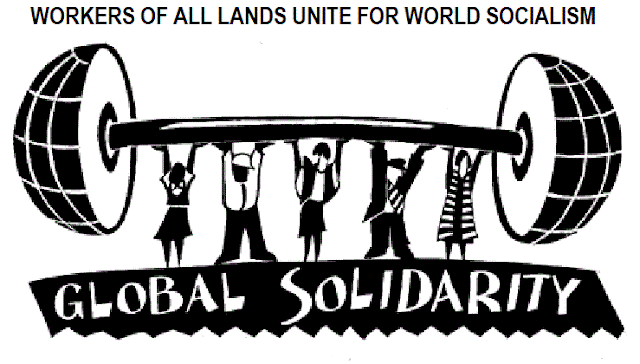The Socialist Party recognises the necessity for all workers to do all they can to maintain wages and working conditions. This is part of the class struggle in capitalism. The working class are the nine-tenths of the population who have to live by selling their only possession: labour-power. It is a commodity. Like all commodities, its price reflects its value, i.e. the labour which has gone to make it, and like all commodities, it is sold on a market where the interests of buyers and sellers are fundamentally opposed. The need for workers to organise and make use of the weapons available to them collectively is clear.
The basis of trade-union organisation is wages and conditions, without any political reference. Many trade unionists support the Labour Party; others are left-wingers, Tories, Greens, etc., all of whom need equally to press to maintain or try to improve their living standards. This shows on one hand that everyone, conscious of it or not, is in the class struggle; and on the other, that the overwhelming majority of trade unionists are not Socialists and do not even think they are. To that extent, the unions have hardly needed persuading that workers and employers have “common interests”.
Political-minded militants believe that in a strike, or when otherwise under pressure from the capitalist class, a mass of trade unionists can be led into a general rebellion against the existing order. The same belief is held about the unemployed; and, as with the unemployed, the position is that (unless they are socialists) they want nothing more than a solution to their immediate problem. When militants are elected to trade-union offices it is in view of their likely success as negotiators, not their political gospels. However, the implication on the part of the militants who profess to be aiming to overthrow capitalism is that they are seeking the support of non-socialists. This was the position taken up by early labour leaders.
Unions are economic organisations with an essential function. It is also a restricted one, and they operate properly by accepting the restriction: political action by them has been chronically damaging to working-class interests. While their success in gaining wage increases depends on the state of production more than anything else, they should always be ready to (as Marx advised them) test the situation and not accept the pleas of the capitalist class and governments.
The restriction means also that trade unions cannot change society. The next step for trade unionists is recognition of the position in which they stand and the fact that the path to socialism is a separate political organisation. With this consciousness, they can end the action in support of capitalism which too often characterises trade unions now, and turn from sectional aims to the interests of the working class as a whole. In a resolution he drafted for the International Workingmen’s Association in 1866, Marx wrote:
"By considering themselves champions and representatives of the whole working class, and acting accordingly, the trade unions must succeed in rallying round themselves all workers still outside their ranks. They must carefully safeguard the interests of the workers in the poorest-paid trades, as, for example, the farm labourers, who due to especially unfavourable circumstances have been deprived of their power of resistance. They must convince the whole world that their efforts are far from narrow and egoistic, but on the contrary, are directed towards the emancipation of the downtrodden masses."
Obviously much trade-union action — for instance, that which centres on the idea of a “wages league” in which groups of workers demand of right to be better paid than others — is divisive and unconcerned with the class issue. Trade unions have much to learn. At the present stage, the Socialist Party observe and approve their efforts to get what they can. But the reservations have to be made: our demand is for workers in the unions to see that they are only half-participating in the class struggle. The question is not what socialists do about trade unions, but what the trade unions are going to do about socialism.





.jpg)

